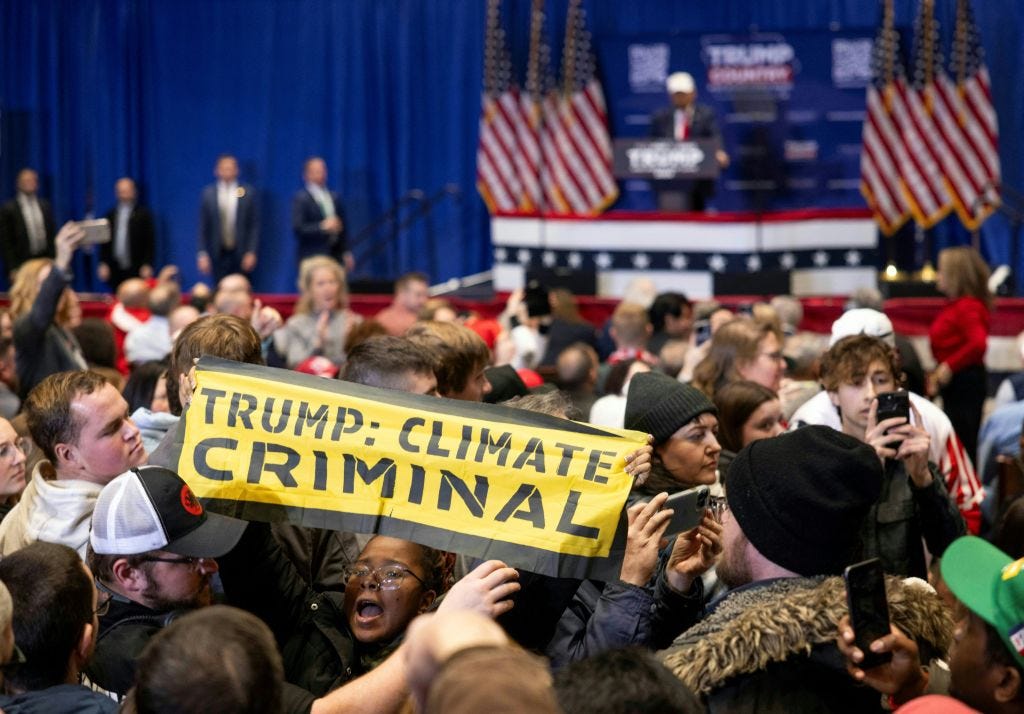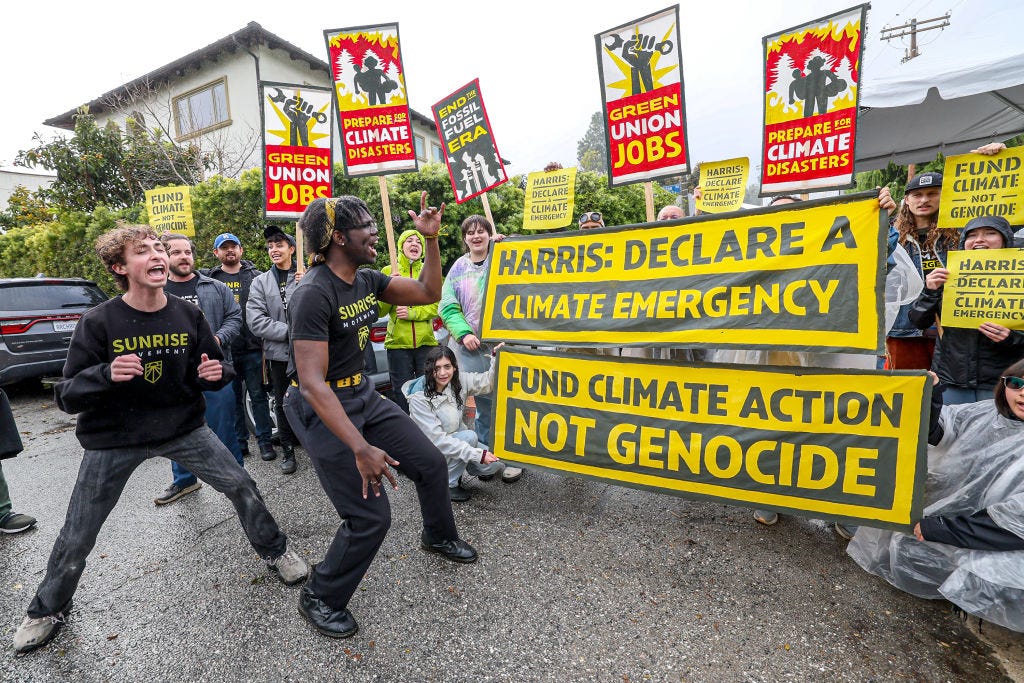2024 Will Likely Be the Hottest Year on Record – But You Wouldn’t Know It From the US Election
Climate change is one of the most pressing issues of our lifetimes, yet even for Harris, it's barely talked about on the campaign trail.

On July 21, history was made. President Joe Biden dropped out of the presidential race, and Kamala Harris quickly went to work earning the support of the delegates needed to secure the Democratic nomination.
It was also, at the time, the hottest day on Earth in the recorded chronicle of humanity.
Three months later, the American South witnessed a once-in-a-lifetime hurricane. And then, not even two weeks later, it experienced another. Meanwhile, Americans across the country have kept their sweaters on the hangers, as much of the US remains unseasonably warm and “abnormally dry” – a tinderbox for wildfires – after the world’s hottest summer. And indeed, such has been the case in California, Oregon, and Nevada, and even extending into states like Nebraska.
Last year was the planet’s hottest year on record. And we are on track to eclipse the record again this year.
In one of the metropoles of global capitalism, these conditions are now not just produced and exported to the rest of the world, they’re appearing more and more within. The necessity to dramatically interrupt that production could not be more apparent.
Beyond increasingly uncontrollable hurricanes and wildfires, ongoing heat waves and smog clouds now saturate the atmosphere – memorializing the outcomes of our social order. The magnitude is matched only by the base cruelty that a sparse few make decisions that exacerbate it all while they remain separate from the consequences surrounding the rest of us.
And in each corner of the ring of this social order? A billionaire blowhard who deems it all a hoax, while offering fossil fuel executives promises to wreck the Earth even more so long as they give him $1 billion; and an opponent who has taken pains – in the face of global climate disaster affecting almost everyone in this country – to separate herself from her past pledges to take on such calamity.
Just consider how each has – or has not – addressed climate change this election, as its consequences continue to wreak havoc on American lives.
‘Drill Baby Drill’
There is no illusion that the Republican Party is interested in substantively confronting any of the man-made crises. The party’s 2024 platform doesn’t even mention the word “climate”: a dampener on the ambitions of Republicans like Utah Rep. John Curtis, who launched the “Conservative Climate Caucus” in 2021 with the hopes of educating Republicans on climate policies and legislation.
“Don’t be too tough on us, but watch us. I am totally ready to be judged a year from on how much impact we’ve had on the debate,” he said at the time of the group’s founding.
But it doesn't take much harshness to deem Curtis’ conviction as foolhardy – particularly if Donald Trump is reelected. After completely dismantling the party and making it his, Trump went on to roll back more than 100 environmental policies and rules governing clean air and water, wildlife protection, and toxic chemicals during his first term.
Since leaving the Oval Office, Trump has maintained his kamikaze stride. “Drill, baby, drill!” he has repeated numerous times, including as he accepted the nomination at the Republican National Convention. In the September debate, the former president did not address climate change at all when asked about it. Instead, he discussed tariffs and theorized about Biden being “loyal” to Ukraine and China (receiving a “President Trump, thank you” in response from the moderator).
Last week, when a 30-year construction veteran asked Trump at a Univision-hosted town hall whether he still thought climate change was a hoax, the 78-year-old went on a three-minute ramble in which he falsely claimed his administration had the “cleanest air” and “the cleanest water,” dismissed fears of rising oceans, criticized proposed solutions like the Green New Deal, and boasted of “environmental awards” he received for the way he used “the water, the sand, the mixing of the sand and the water.”
He didn’t answer the actual question.
Meanwhile, his running mate, JD Vance, has called climate change “weird science” and lied about the US having one of the cleanest economies in the world (it’s third worst, behind India and China, according to one metric).
A Softening Strategy?
On the other side of the aisle, Vice President Harris has a relatively promising record. Of course, she was second in command to the administration that implemented the most expansive (low-bar) climate agenda in American history and cast the tie-breaking vote advancing the Inflation Reduction Act.
Before then, Harris cut her teeth as California attorney general, taking on big fossil fuel corporations (the likes of which Trump tried to cut his $1 billion deal with). “Crimes against our environment must be met with swift action and accountability,” Harris said in 2016 as she announced charges against a pipeline company responsible for a massive oil spill.

She soon became a strong proponent of ideas such as the Green New Deal and banning fracking, particularly during the 2020 primaries (until Biden’s ascendance undercut the possibility of such goals).
At one point, in a 2019 town hall, Harris connected oil companies’ behavior to that of Big Tobacco. “And not unlike the tobacco companies, after years – ’cause they’d done the research — they knew the harm that their product was causing. They were making so much money that they kept that secret — same thing with these big oil companies. And they need to pay the price,” she said (referencing, perhaps, how Exxon knew about the risk of climate change nearly 50 years ago).
But despite that record, Harris has avoided talking at length about it or climate change broadly – despite the immediate relatability it may incite for millions of Americans or the connections she could draw between Trump and corruption or environmental disaster in the South – while trumpeting record US oil production.



